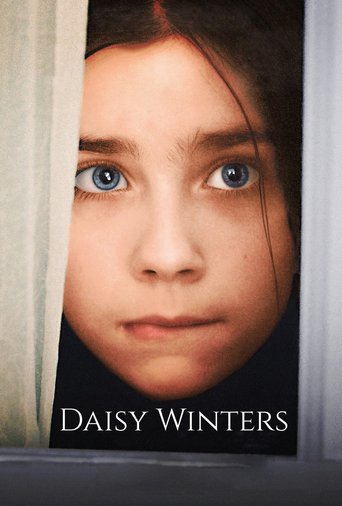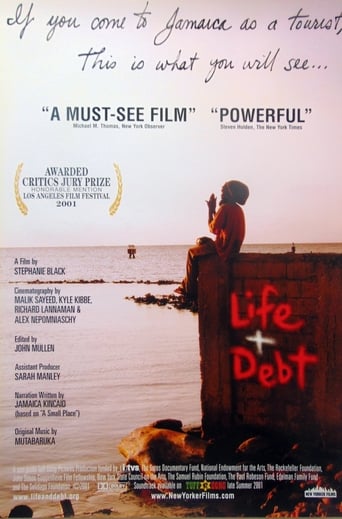Life and Debt is a 2001 American documentary film that examines the economic and social situation in Jamaica, and specifically how the International Monetary Fund and the World Bank's structural adjustment policies have impacted the island.


Similar titles




Reviews
Given the gushingly positive reviews this movie has received elsewhere on IMDb, given the negative review I am about to give it must be clear that I must be some pro-big business evil white capitalist who probably drives a Hummer and kills baby seals for fun, right? No, not really. I am actually rather skeptical of many globalization's claims, specifically how they relate to income distribution. However, apparently unlike many of other commenters, I actually know a thing or two about economics and refuse to be swayed by the emotionally strong but intellectually bankrupt arguments that, for the most part, this movie consists of.Here's a basic summary of the movie: 1. Jamaica is straddled with significant debts to the IMF (the movie states US $7b) 2. The IMF is a mechanism created by rich white countries to keep poor dark countries poor. 3. As a tourist, you will ignorantly go to Jamaica and enjoy your time. All the while, most of the money you spend will go back to foreign corporations. The Jamaicans will smile at you as they serve you, but secretly they mostly hate you, or at least what you represent and are doing to their country.Overlay this theme with somber reggae music and implications of racism and you have a story that would make the ignorant want to join the ranks of the Molotov cocktail at any given G8 summit.Unfortunately, it's pretty much complete nonsense.For example, one thing that this movie states is that the IMF (or some other international boogeyman) forced Jamaica to devalue its currency out of some evil plot to economically enslave Jamaicans. The reality is that the previously artificially high Jamaican currency served only the Jamaican elite the IMF's insistence that the Jamaican currency actually be subject to market forces (as part of a structural adjustment program associated with the IMF loans that were intended to keep Jamaica from slipping back into the fiscal irresponsibility that got it into the position of needing to take loans in the first place) ensures that the country remain an attractive destination for tourist dollars and gives strength to its export businesses.Let's not forget: Jamaica is a beautiful country that can generate money through tourism pretty much as easily as Arab countries can pull oil from the ground. Jamaica had benefited from generally moderate and reasonable colonial rule and has had no significant conflicts since. It sits within enviable flight time from the wealthy USA and enjoys status as a destination for Europeans as well due to its historical ties. Its people, culture, and music are generally seen in a positive light. In short, Jamaicans are very lucky indeed compared to, say, Haitians.And so the movie goes on and on. Look at the poor Jamaicans. You are a stupid and fat tourist. Don't you even consider when you flush the toilet in your hotel that some of the waste goes into the same ocean that used to bring slaves from Africa? (Yes, this is actually what the movie pretty much says at some point the point of "you Jamaican since you inherited a sound governmental and educational system from Great Britain, why can't you set up proper laws to prevent this if you are so concerned?" is nowhere to be found.) In short, according to this movie everything that happens bad to Jamaica is not Jamaica's fault. Its America's fault that Jamaica's farmers use inefficient and ancient farming methods to the point where they can't even compete with imported food even given the Jamaican currency weakness and relative ease of transport. Large foreign businesses are evil because they both set up shop there to "exploit" local Jamaicans by giving them jobs, and then by pull out when corruption and inefficiency make them unprofitable.Jamaica has relatively high literacy (partly a colonial legacy). It also has high levels of fundamentalist religiosity and substance abuse two factors that the film doesn't really go into, since, well, that would be far harder than just pointing fingers. I feel sorry for the people of Jamaica. Theirs is no easy life. But, to put the blame on tourists and the IMF, arguably the two things that are actually keeping the country afloat and not disintegrating into Haiti, is perverse. Don't fall for this movie's propaganda.
Life and Debt is an arresting, soul-stirring documentary with fantastic images and a story that will haunt you long after the movie is over. I hope that watching it makes you reconsider what you know about how the world works economically, and the role of the International Monetary Fund and World Bank. This film is an adaption of Jamaica Kincaid's novel "A Small Place," originally based on the story of Antigua (changed to Jamaica for the purposes of this film). If you enjoy the movie, be sure to read the book. In the film, as in the novel, Kincaid's voice-over narration is a powerful reminder of the complicated relationship between tourist and native, powerful and powerless, oppressors and oppressed. I would recommend this documentary to anyone interesting in how developed nations like the United States affect the development of Third World countries like Jamaica, even if you know nothing about it.
For anyone who wonders "why they hate us," watch this documentary and the mystery will be solved. It thoroughly documents how the US, the WTO, and the IMF have systematically destroyed every aspect of Jamaican economic opportunity and culture.The US didn't abolish slavery in the 19th century; they simply outsourced it. Take a look inside the Kingston Free Zone and you'll see the slaves still at work. Visit a Jamaican banana plantation and learn about how the economy of a sovereign nation was subjugated in the name of "free trade."In short, fellow fat Americans, pull your heads out of your globalizing butts and watch this film, and then try -- for just a moment, at least -- to put yourself on the other side of the coin. Imagine how you would feel about a foreign agency that took away your livelihood, that treated you like chattel, that demanded you stop making a living so that a transnational corporation could capture the last 5% of a market share.Wouldn't you hate them, too?
This is the Jamaica the tourists see, says the narrator in Stephanie Black's documentary Life and Debt, a country of lush jungles, clear blue water, and sandy beaches. Beyond the luxury hotels, however, is a third world country fighting poverty, crime, and hopelessness. Based on the novel by Jamaica Kincaid A Small Place, Life and Debt, the film studies the effects of the policies of the International Monetary Fund (IMF) and the World Bank on the economy of Jamaica, focusing on the impact of economic globalization on the dairy farmers and factory workers. Backed by a soundtrack of native reggae music, Life and Debt is filled with economic facts that require some knowledge to fully understand. You don't need a master's degree in Economics, however, to understand the desperate faces of children in poverty, the agony of farmers who can't sell their crops, or the hopelessness of factory workers who earn the equivalent of thirty US dollars per week. Black interviews former Prime Minister Michael Manley who explains how the current situation came to be. When Jamaica achieved its independence in 1962 after being a colony of Great Britain for 400 years, help was needed to build its economy. The International Monetary Fund (IMF) and the World Bank gladly supplied this money in the form of short-term loans. These loans though came with strings attached. Subsidies to local farmers were prohibited and tariff barriers were lowered to allow cheap foreign goods to come into the country, inevitably driving local industries out of business. What's remains is tourism, sweatshops and fast-food chains. Manley blames the big Western powers that have used Jamaica for cheap labor and easy sales. For example, thanks to huge subsidies other countries including the United States exported powdered milk to Jamaica at an excessively low price, forcing the local dairy industry to shut down. He also points out that big American businesses like Chiquita, Dole, and Del Monte have worked to stifle exports of local Jamaican bananas. Manley asks of the IMF, "You ask, 'In who's interest? I ask, 'Who set it up?" Watching this documentary, it became clearer to me why thousands of people took to the streets in Seattle to protest the WTO Conference. It may not be widely known but the WTO has established ground rules that make it easier for the developed countries to market their products in third world countries. Under WTO rules,1. Governments are not allowed to pass laws that favor local firms and discriminate against foreign-owned corporations.2. Governments are not allowed to prevent foreign nationals from buying a controlling interest in local companies.3. Governments are not allowed to subsidize domestic companies.4. Governments are not allowed to pass laws that would provide favorable terms of trade to particular trading partners.Ralph Nader said it all when he described globalization as being the subordination of human rights, environmental rights, and consumer rights. The International Monetary Fund, the World Bank, and the Inter-American Development Bank now own almost every facet of the Jamaican economy and the only ones that are making money are franchises like McDonalds, Wendy's, and Burger King who contribute little more than unskilled low paying service jobs. If you are thinking about asking the IMF to change its policies, keep in mind that any change in IMF policy requires an 80% approval and the richest nations such as the United States, Western Europe, Japan make up more than 80% of the vote. Life and Debt, like the recent film Bowling for Columbine, is one-sided, in your face, and may appeal only to those already in agreement. However, its images are so vivid that, for the first time, you may experience the human impact of policies that can turn the world into "one big casino".

